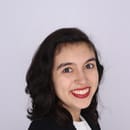Ream Shukairy’s debut novel, “The Next New Syrian Girl,” is powerfully poignant in which two sharp-witted bad-ass hijabis struggle with the pressure of being the perfect Syrian daughter. It tells the tale of two Syrian girls, one a Syrian-American boxer, and a refugee from Syria trying to find themselves.
In the vein of “A Very Large Expanse of Sea” and “I Am Not Your Perfect Mexican Daughter,” this novel effortlessly navigates the complexity of diaspora and feeling not enough. Shukairy’s novel gives a raw look at what diaspora can mean and the repercussions of the Syrian Revolution both at home and abroad.
Ream Shukairy is a Syrian-American born and raised in Orange County, California, but spends her summers in Syria. Whether in California or Syria, she feels at home where her family is and wherever there’s a beach. She has a talent for learning languages and is always on the search for the next place she can travel. The daughter of immigrants, there isn’t a stereotype she won’t try her hardest to defy. She can be found reading at the beach, watching anime with her sisters, or playing volleyball. She currently resides in Boston for graduate school.
If you had to pick only one stereotype that you’d like to defy, what would it be and why?
That Muslim girls or Muslim women can’t do X [insert literally anything as ‘X’]. All my life I’ve heard about all the things I can’t do or that I won’t be able to do because I’m a Muslim girl. This came from people in my communities growing up, from the perceptions of the general public about Muslim girls, or from the lack of support given to Muslim girls when it comes to certain aspirations. Obviously, the stereotype had to originate from somewhere, but it definitely amplified the doubts and shaped my younger years in all the harmful ways that stereotypes do. But I was always so determined to not let it define me. It’s one of the hardest stereotypes I’ve had to defy because it’s so embedded into so much daily life and is rooted in the overall perception that Muslim girls can’t. And I just want everyone to know that Muslim girls can. Do anything and everything. I’m glad I get to write novels in which the main characters can battle with this stereotype and overcome it, and hopefully, through writing, I can defy this stereotype a little more every day and my Muslim readers can also come to defy it.
Between Khadija and Leene, who would you say you most relate to and why?
I would say I relate to Khadija more because we’re both Syrian American and have those Syrian parts of us and the American parts of us coinhabiting [within] us. We both speak Arablish, we both love sports and can be a little prickly. I also really relate to her connection with Syria and being unable to visit Syria due to the revolution and how that shaped us. I’m also athletic and am into sports and will try just about everything once (I had a short stint in boxing while writing this book and would love to get back to it!). Khadija’s general growth is really reminiscent of my own growth too. And I relate to Leene too! Her interest in how context changes words and her attention to which words are used and why is something I’m always thinking about.
What are some of the best summer moments you have in Syria?
Oh, there are so many! There’s a scene in the book where Khadija is describing her grandpa’s house where all her aunts and uncles surround her playing cards and drinking shai. That whole scene of the last night of Khadija’s time in Syria was inspired from my own life down to the lemon tree in the courtyard of the house and the way everyone seemed to cry harder during that goodbye compared with all the other goodbyes over the years. I have memories of staying in chalets by the sea or in bungalows at the water parks where my aunts and uncles and all my cousins were our neighbors for mini vacations in Syria. I also have the most amazing memories of visiting my uncles’ orchards in Syria, eating the sweetest fruits and staying up until Fajr with the whole my aunts and uncles and so many cousins, experiencing the winds at dawn before we all headed to sleep. It really was the most magical place for me.
YA books about the Middle East are on the rise with authors like Zoulfa Katouh. Why do you think this is? Is there something about Syria that you think Americans have a misinterpretation of or something they don’t know?
I feel like YA books about Syria are on the rise because the country was picked up on everyone’s radar after the revolution began in 2011 and the events that followed including the refugee crisis. This goes for a lot of other YA books set about the Middle East because the Arab Spring really introduced a lot of Middle Eastern countries to the wider public. Before the revolution and the Arab Spring, I remember very few Americans knew where Syria was on a map when I told them where I was from. Then after the revolution I was met with pity and awe because the narrative shifted to Syria having always only existed as this dangerous, war-torn country. I wrote this book because the shift was so limiting and untrue of what I’ve seen and know about my parents and my country. “The Next New Syrian Girl” is like a love letter used to introduce people to the beautiful and rich Syria from my childhood and the one that has endured despite all that has happened since the revolution began. I hope that readers can reflect on their misconceptions of what it is to be from Syria and what it is to be a refugee through Khadija’s and Leene’s story.
Was there anything you wanted to address or accomplish with the publication of your debut novel?
Apart from addressing misconceptions of what it is to be Syrian, I wanted to introduce the YA landscape to Arab American communities because there aren’t many books that are set within these communities. There are such rich settings and unique relationships within these communities that I wanted to share with the world, but more importantly to provide a piece of media that is relatable to Syrian Americans and Muslims. I also wanted to use my debut to have a lot of difficult conversations that first-gen kids have about identity and belonging, especially from my perspective as a Syrian Muslim American.
What can readers look forward to in this novel that maybe differs from other Middle Eastern set YA novels?
“The Next New Syrian Girl” is set in Detroit within and around a Syrian community in a fictional town called Rochester Heights. A lot of what goes on there is so relatable to readers, not only Arab Americans or American Muslims or first or second gen kids, but in general, I feel all readers will be able to relate to the characters in ways they never thought they could. Whether that be the inner commentary of identity and belonging, the halal romance, the perfect daughter struggles, the boxing gym banter and drama, or the stigma surrounding mental health that is touched upon in the book.
There are books like Zoulfa Katouh’s “As Long as the Lemon Trees Grow” that are set in the Middle East which tell another part of the story that is very important, but that occurs before Syrian refugees arrive in the US and are faced with the Arab American and Muslim communities here. Spoiler alert: it gets dramatic! “The Next New Syrian Girl” is like a continuation of what happens once someone leaves and when they aren’t allowed to return to their home.
Thank you so much Ream for answering my questions! I really loved how you elaborated upon the writing process along with the novel itself. I’d also like to thank Cassie Malmo from Little, Brown Books for Young Readers from the Hachette Book Group. She’s been so wonderful to send along authors and novels my way to write for my Author Spotlight series. She’s also connected me with Hannah Klein from the same imprint who helped me along with the interview process and sent me Ream’s answers. Without the three of them, this wouldn’t have been possible so thank you endlessly for your continued support.
Ream is set to publish another novel in the winter of 2024, “Six Truths and a Lie,” which features six Muslim teens who find themselves in handcuffs, falsely accused of an alleged attack on a Los Angeles beach and must trust or turn their backs on one another to prove their innocence. (Sign me up!)


